The Excretory System How Our Body Eliminates Cellular

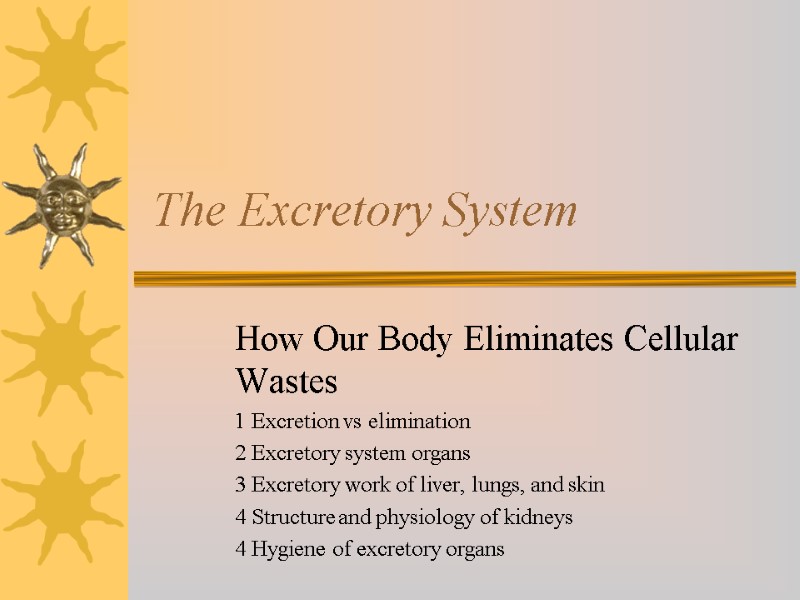
The Excretory System How Our Body Eliminates Cellular Wastes 1 Excretion vs elimination 2 Excretory system organs 3 Excretory work of liver, lungs, and skin 4 Structure and physiology of kidneys 4 Hygiene of excretory organs
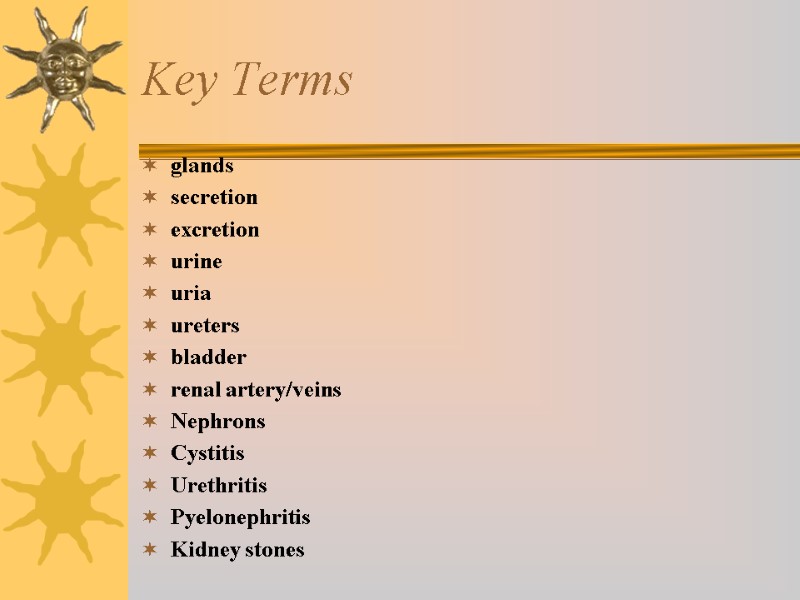
Key Terms glands secretion excretion urine uria ureters bladder renal artery/veins Nephrons Cystitis Urethritis Pyelonephritis Kidney stones
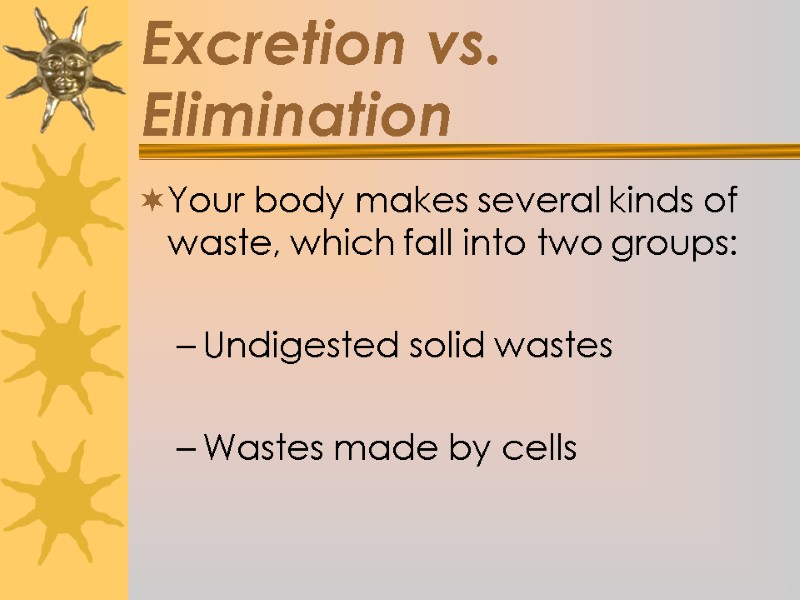
Excretion vs. Elimination Your body makes several kinds of waste, which fall into two groups: Undigested solid wastes Wastes made by cells
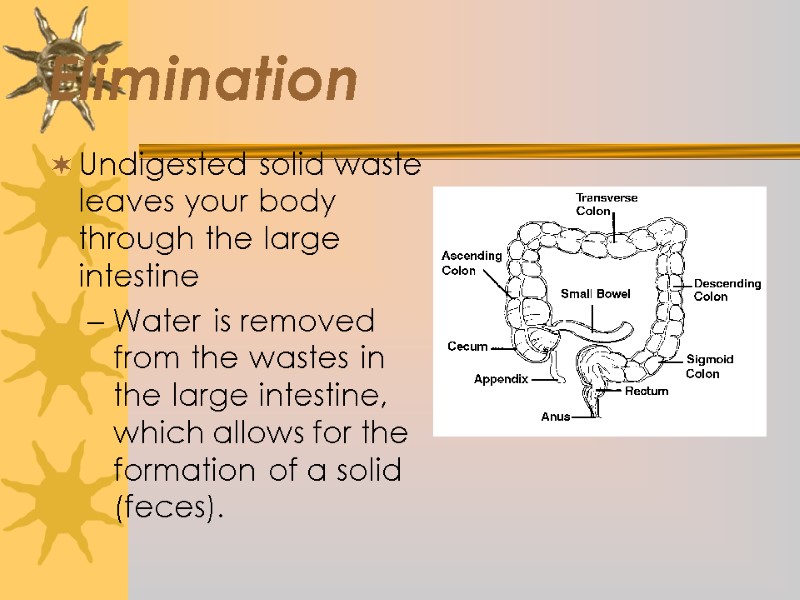
Elimination Undigested solid waste leaves your body through the large intestine Water is removed from the wastes in the large intestine, which allows for the formation of a solid (feces).
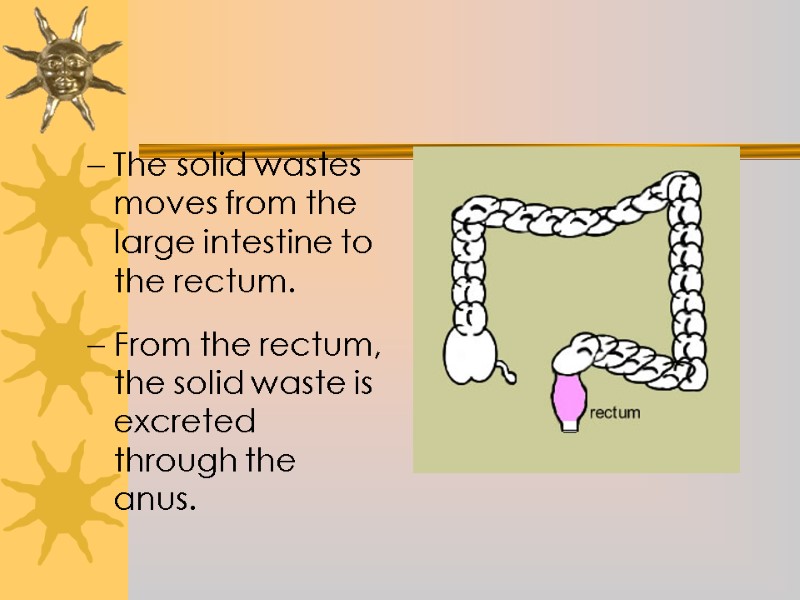
The solid wastes moves from the large intestine to the rectum. From the rectum, the solid waste is excreted through the anus.
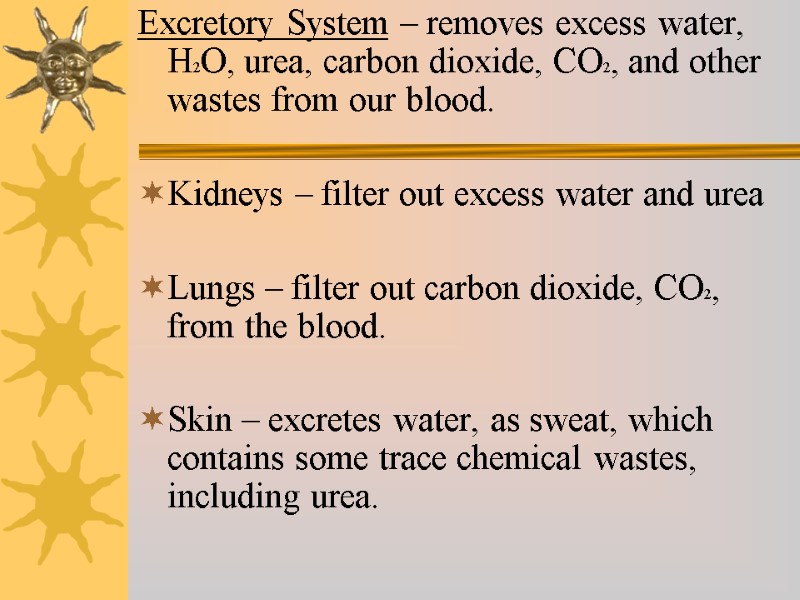
Excretory System – removes excess water, H2O, urea, carbon dioxide, CO2, and other wastes from our blood. Kidneys – filter out excess water and urea Lungs – filter out carbon dioxide, CO2, from the blood. Skin – excretes water, as sweat, which contains some trace chemical wastes, including urea.
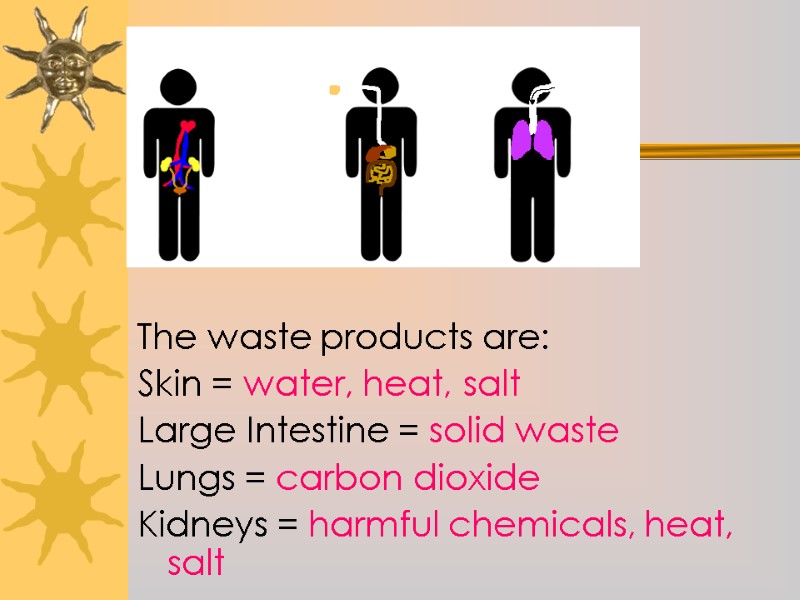
The waste products are: Skin = water, heat, salt Large Intestine = solid waste Lungs = carbon dioxide Kidneys = harmful chemicals, heat, salt
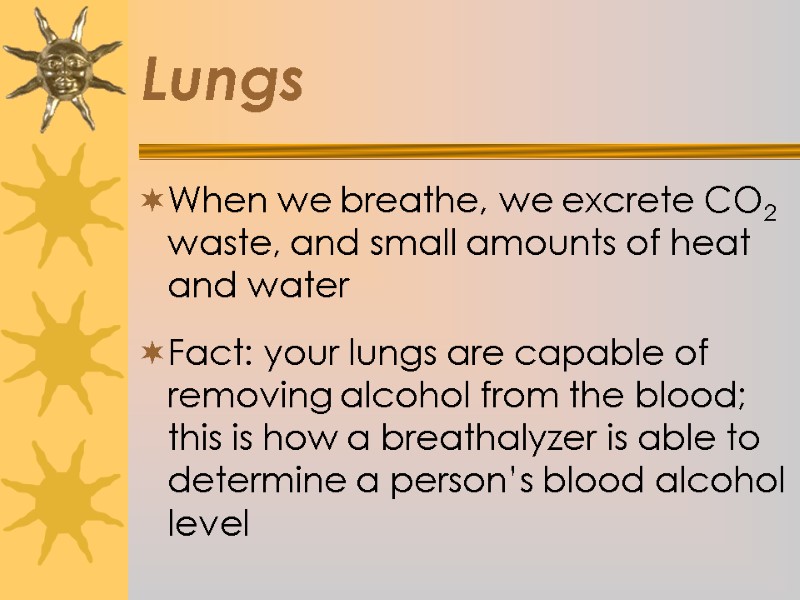
Lungs When we breathe, we excrete CO2 waste, and small amounts of heat and water Fact: your lungs are capable of removing alcohol from the blood; this is how a breathalyzer is able to determine a person’s blood alcohol level
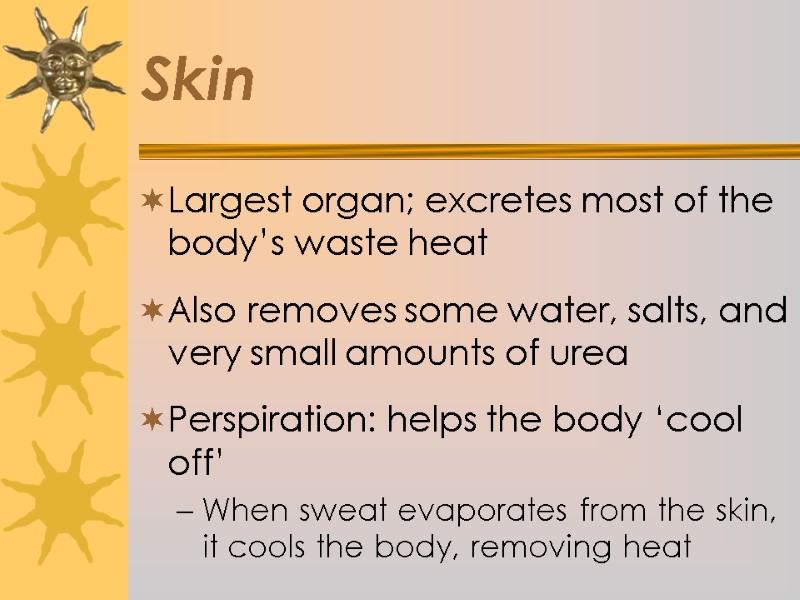
Skin Largest organ; excretes most of the body’s waste heat Also removes some water, salts, and very small amounts of urea Perspiration: helps the body ‘cool off’ When sweat evaporates from the skin, it cools the body, removing heat
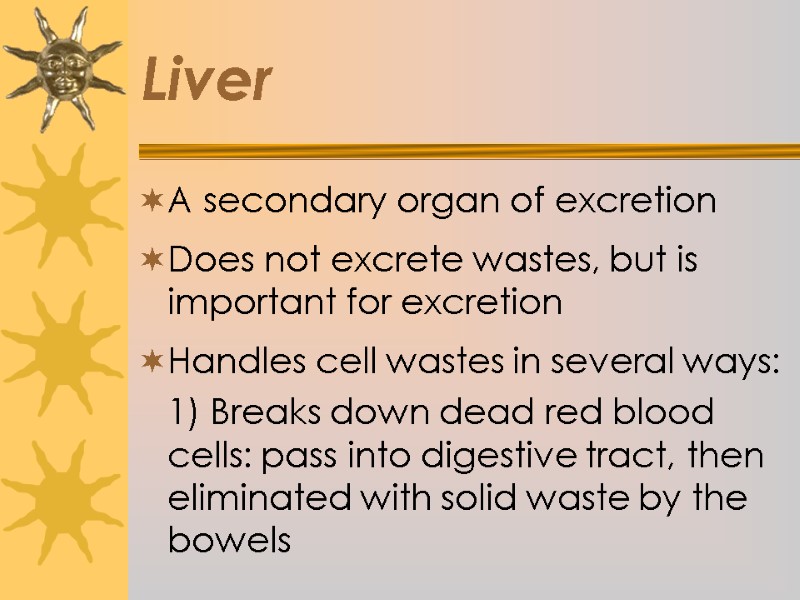
Liver A secondary organ of excretion Does not excrete wastes, but is important for excretion Handles cell wastes in several ways: 1) Breaks down dead red blood cells: pass into digestive tract, then eliminated with solid waste by the bowels
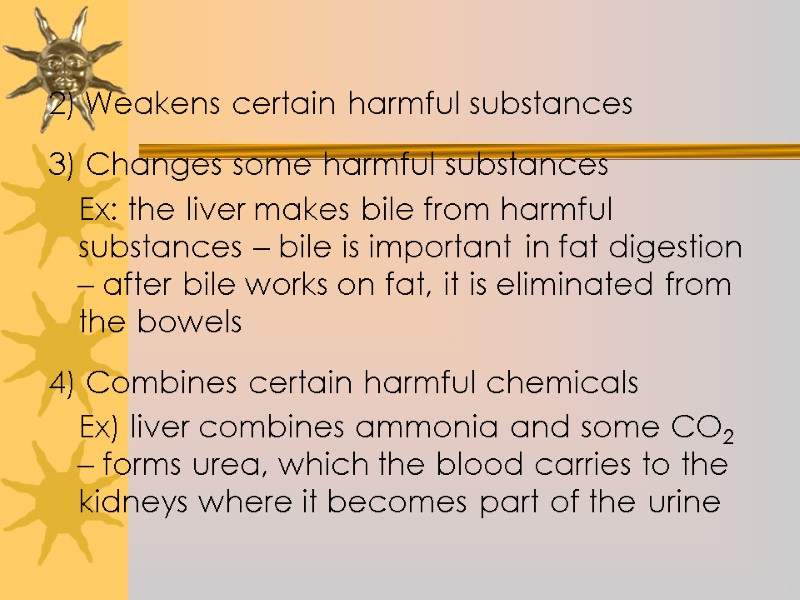
2) Weakens certain harmful substances 3) Changes some harmful substances Ex: the liver makes bile from harmful substances – bile is important in fat digestion – after bile works on fat, it is eliminated from the bowels 4) Combines certain harmful chemicals Ex) liver combines ammonia and some CO2 – forms urea, which the blood carries to the kidneys where it becomes part of the urine
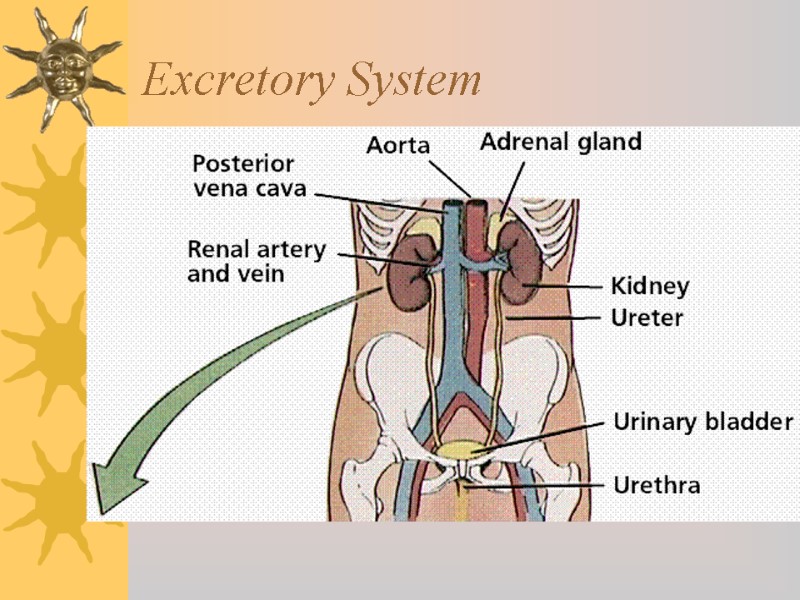
Excretory System
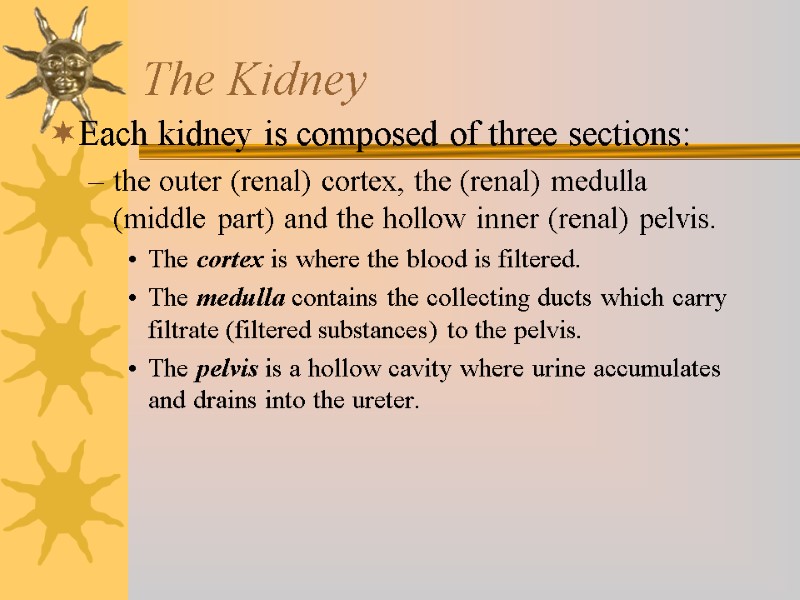
The Kidney Each kidney is composed of three sections: the outer (renal) cortex, the (renal) medulla (middle part) and the hollow inner (renal) pelvis. The cortex is where the blood is filtered. The medulla contains the collecting ducts which carry filtrate (filtered substances) to the pelvis. The pelvis is a hollow cavity where urine accumulates and drains into the ureter.
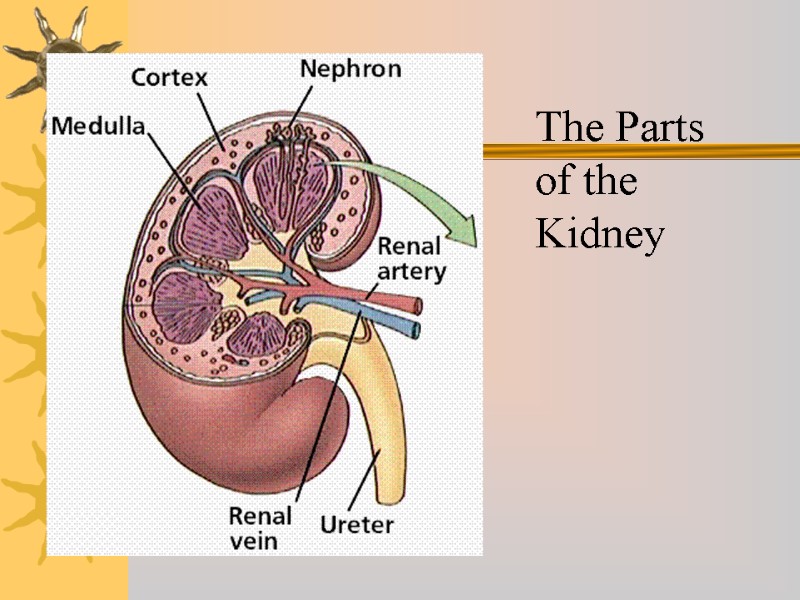
The Parts of the Kidney
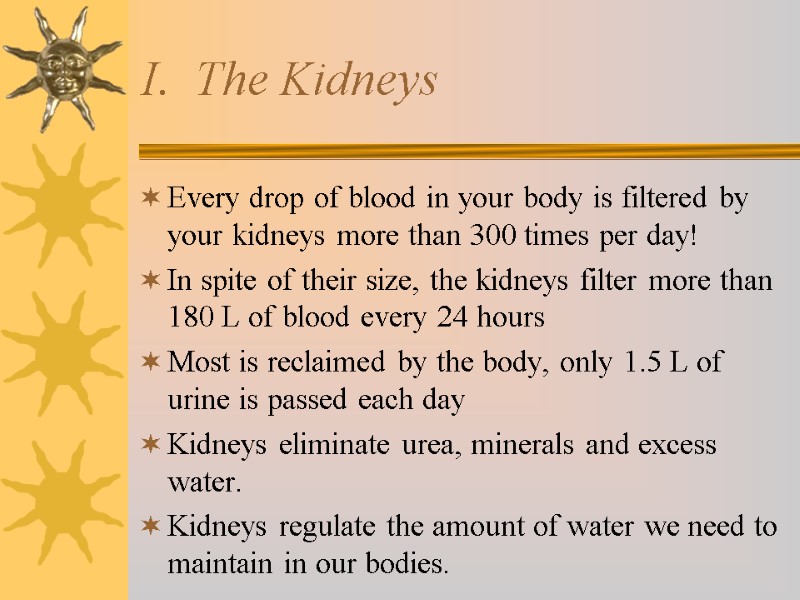
I. The Kidneys Every drop of blood in your body is filtered by your kidneys more than 300 times per day! In spite of their size, the kidneys filter more than 180 L of blood every 24 hours Most is reclaimed by the body, only 1.5 L of urine is passed each day Kidneys eliminate urea, minerals and excess water. Kidneys regulate the amount of water we need to maintain in our bodies.
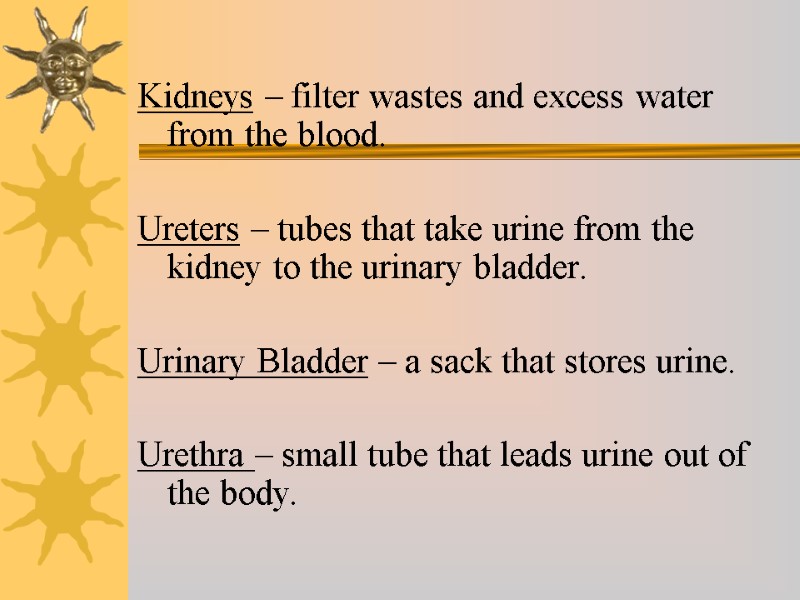
Kidneys – filter wastes and excess water from the blood. Ureters – tubes that take urine from the kidney to the urinary bladder. Urinary Bladder – a sack that stores urine. Urethra – small tube that leads urine out of the body.
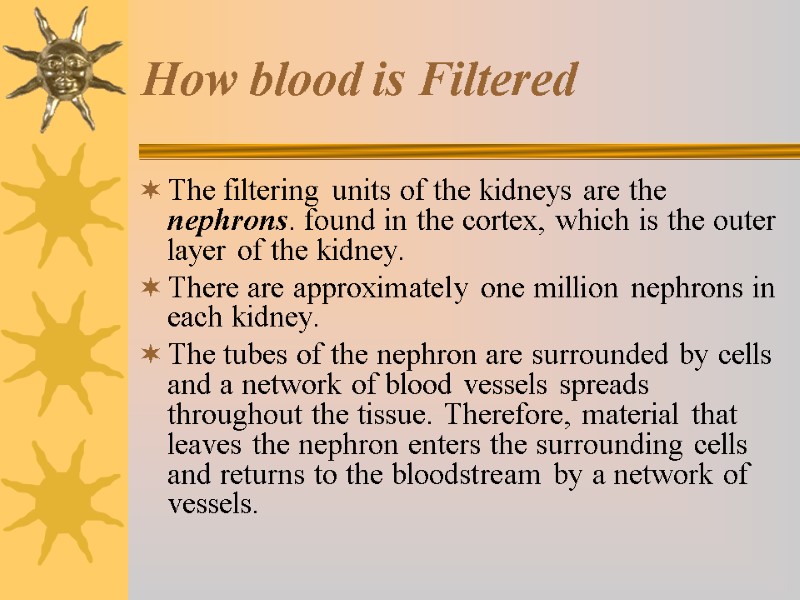
How blood is Filtered The filtering units of the kidneys are the nephrons. found in the cortex, which is the outer layer of the kidney. There are approximately one million nephrons in each kidney. The tubes of the nephron are surrounded by cells and a network of blood vessels spreads throughout the tissue. Therefore, material that leaves the nephron enters the surrounding cells and returns to the bloodstream by a network of vessels.
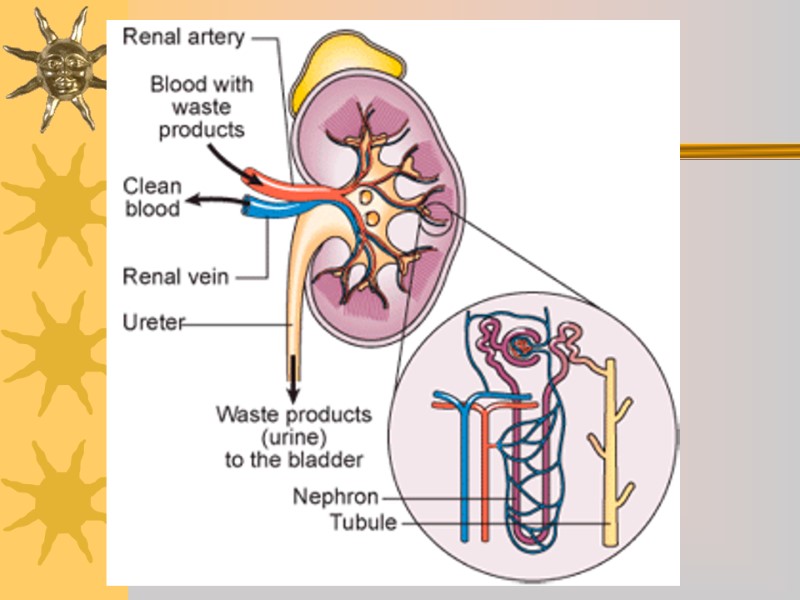
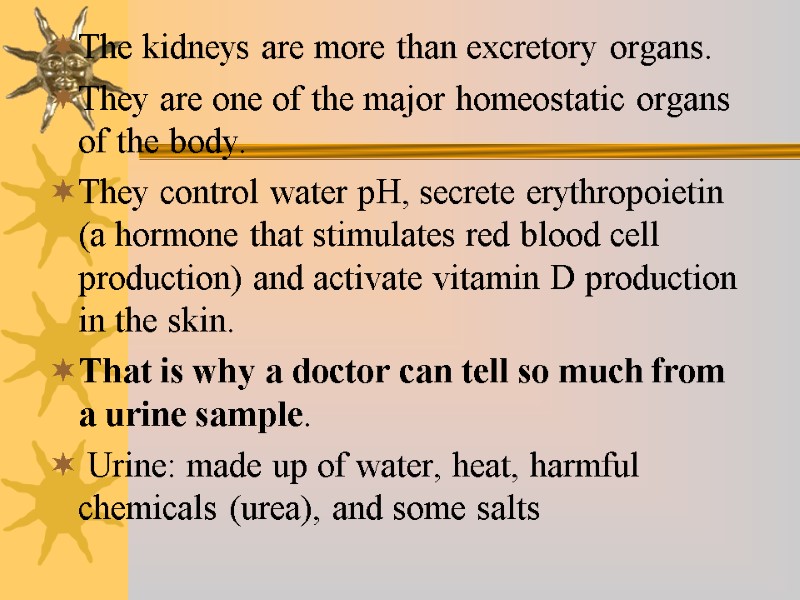
The kidneys are more than excretory organs. They are one of the major homeostatic organs of the body. They control water pH, secrete erythropoietin (a hormone that stimulates red blood cell production) and activate vitamin D production in the skin. That is why a doctor can tell so much from a urine sample. Urine: made up of water, heat, harmful chemicals (urea), and some salts
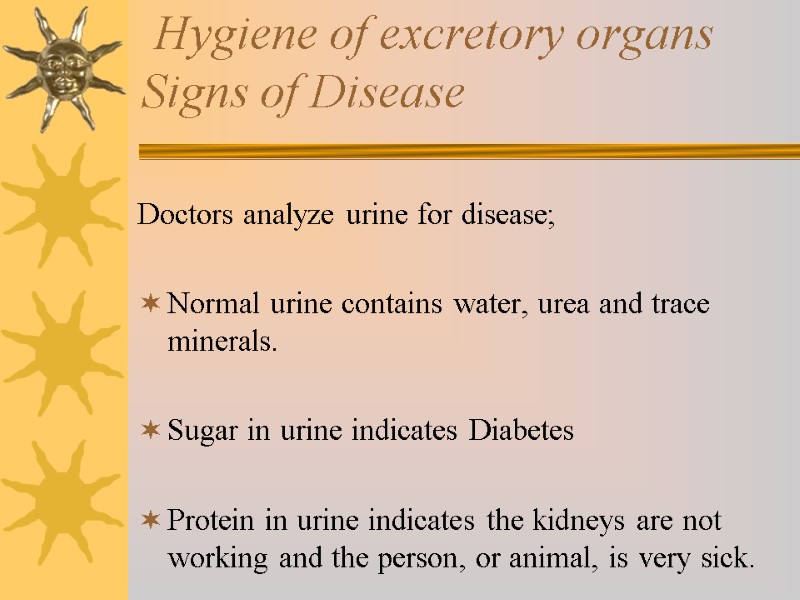
Hygiene of excretory organs Signs of Disease Doctors analyze urine for disease; Normal urine contains water, urea and trace minerals. Sugar in urine indicates Diabetes Protein in urine indicates the kidneys are not working and the person, or animal, is very sick.
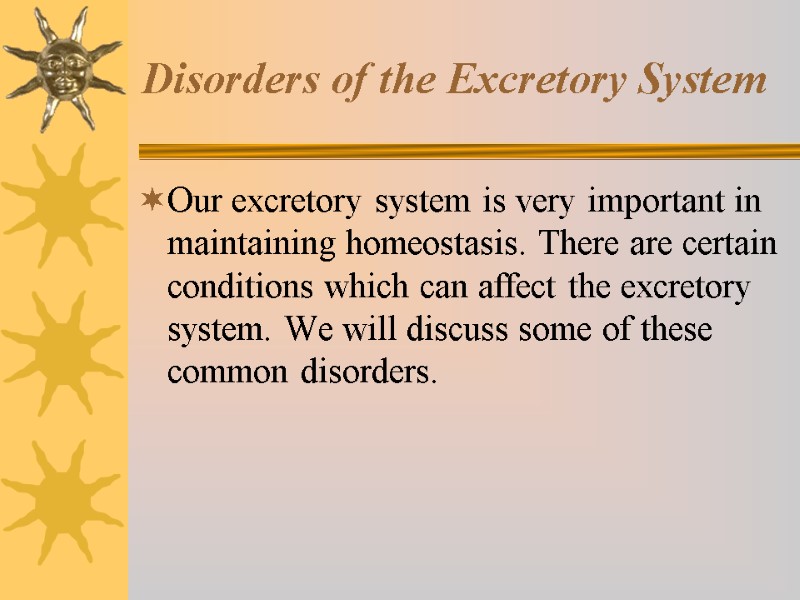
Disorders of the Excretory System Our excretory system is very important in maintaining homeostasis. There are certain conditions which can affect the excretory system. We will discuss some of these common disorders.
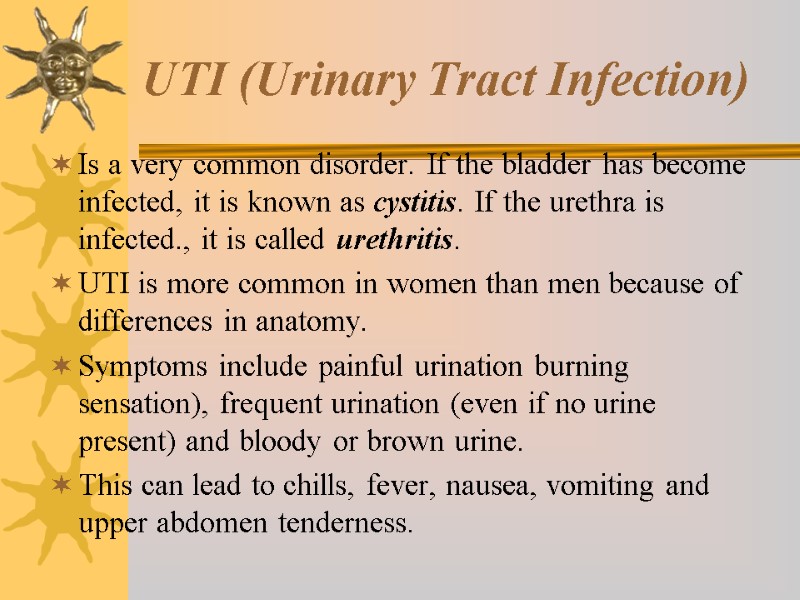
UTI (Urinary Tract Infection) Is a very common disorder. If the bladder has become infected, it is known as cystitis. If the urethra is infected., it is called urethritis. UTI is more common in women than men because of differences in anatomy. Symptoms include painful urination burning sensation), frequent urination (even if no urine present) and bloody or brown urine. This can lead to chills, fever, nausea, vomiting and upper abdomen tenderness.
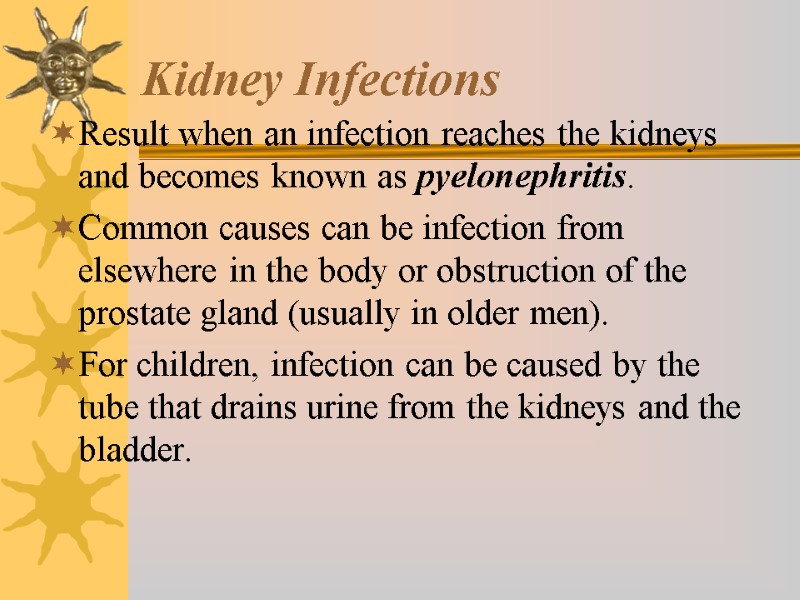
Kidney Infections Result when an infection reaches the kidneys and becomes known as pyelonephritis. Common causes can be infection from elsewhere in the body or obstruction of the prostate gland (usually in older men). For children, infection can be caused by the tube that drains urine from the kidneys and the bladder.
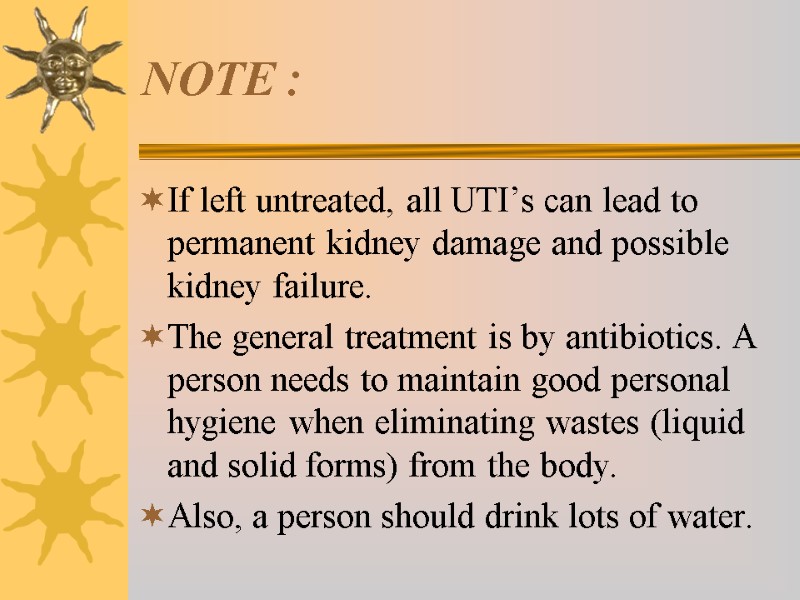
NOTE : If left untreated, all UTI’s can lead to permanent kidney damage and possible kidney failure. The general treatment is by antibiotics. A person needs to maintain good personal hygiene when eliminating wastes (liquid and solid forms) from the body. Also, a person should drink lots of water.
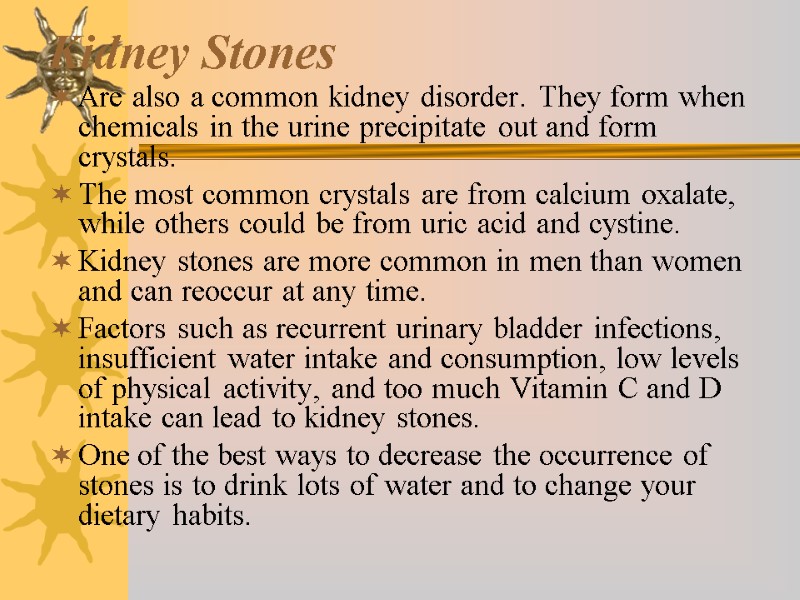
Kidney Stones Are also a common kidney disorder. They form when chemicals in the urine precipitate out and form crystals. The most common crystals are from calcium oxalate, while others could be from uric acid and cystine. Kidney stones are more common in men than women and can reoccur at any time. Factors such as recurrent urinary bladder infections, insufficient water intake and consumption, low levels of physical activity, and too much Vitamin C and D intake can lead to kidney stones. One of the best ways to decrease the occurrence of stones is to drink lots of water and to change your dietary habits.
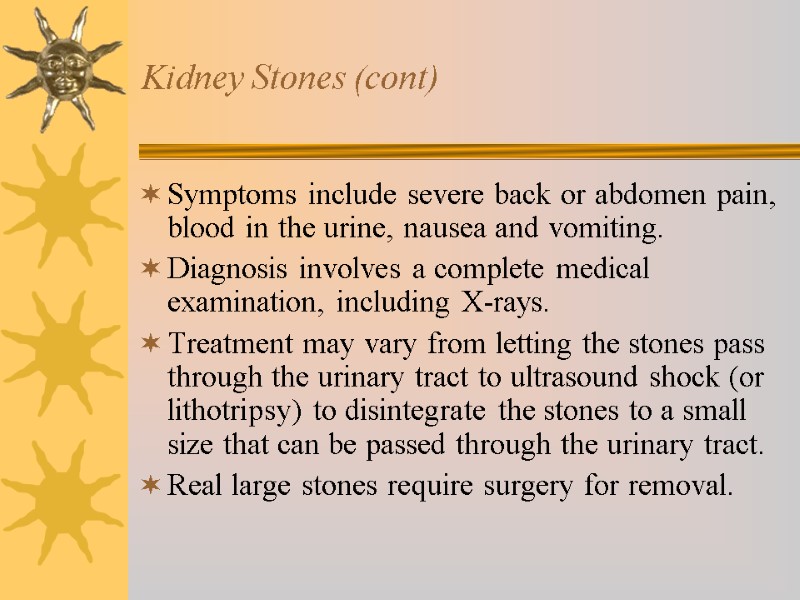
Kidney Stones (cont) Symptoms include severe back or abdomen pain, blood in the urine, nausea and vomiting. Diagnosis involves a complete medical examination, including X-rays. Treatment may vary from letting the stones pass through the urinary tract to ultrasound shock (or lithotripsy) to disintegrate the stones to a small size that can be passed through the urinary tract. Real large stones require surgery for removal.
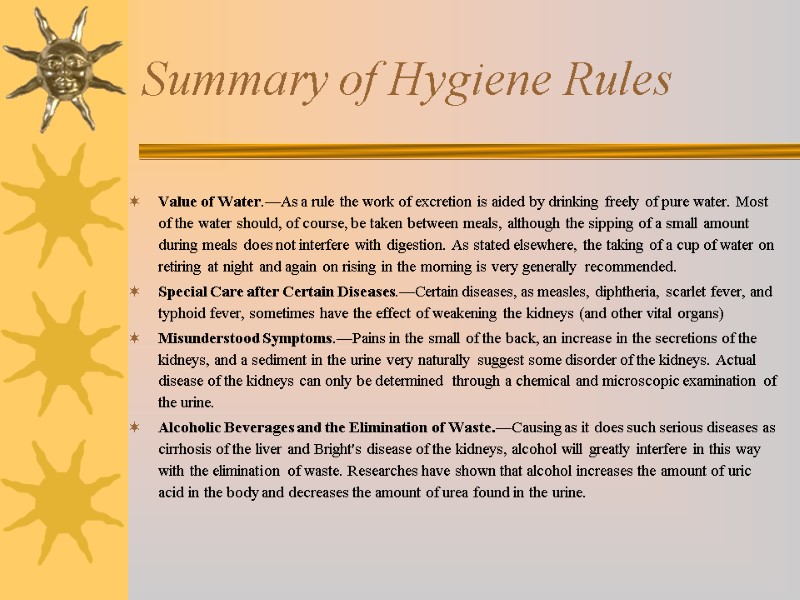
Summary of Hygiene Rules Value of Water.—As a rule the work of excretion is aided by drinking freely of pure water. Most of the water should, of course, be taken between meals, although the sipping of a small amount during meals does not interfere with digestion. As stated elsewhere, the taking of a cup of water on retiring at night and again on rising in the morning is very generally recommended. Special Care after Certain Diseases.—Certain diseases, as measles, diphtheria, scarlet fever, and typhoid fever, sometimes have the effect of weakening the kidneys (and other vital organs) Misunderstood Symptoms.—Pains in the small of the back, an increase in the secretions of the kidneys, and a sediment in the urine very naturally suggest some disorder of the kidneys. Actual disease of the kidneys can only be determined through a chemical and microscopic examination of the urine. Alcoholic Beverages and the Elimination of Waste.—Causing as it does such serious diseases as cirrhosis of the liver and Bright's disease of the kidneys, alcohol will greatly interfere in this way with the elimination of waste. Researches have shown that alcohol increases the amount of uric acid in the body and decreases the amount of urea found in the urine.
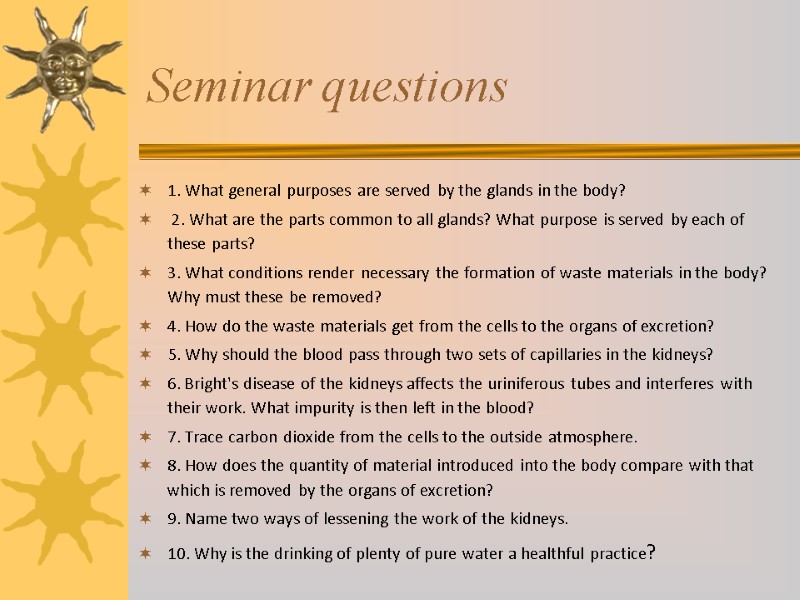
Seminar questions 1. What general purposes are served by the glands in the body? 2. What are the parts common to all glands? What purpose is served by each of these parts? 3. What conditions render necessary the formation of waste materials in the body? Why must these be removed? 4. How do the waste materials get from the cells to the organs of excretion? 5. Why should the blood pass through two sets of capillaries in the kidneys? 6. Bright's disease of the kidneys affects the uriniferous tubes and interferes with their work. What impurity is then left in the blood? 7. Trace carbon dioxide from the cells to the outside atmosphere. 8. How does the quantity of material introduced into the body compare with that which is removed by the organs of excretion? 9. Name two ways of lessening the work of the kidneys. 10. Why is the drinking of plenty of pure water a healthful practice?
9870-lecture_8_the_excretory_system.ppt
- Количество слайдов: 28

